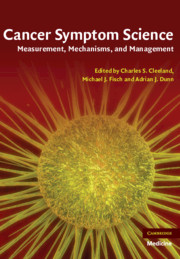Book contents
- Frontmatter
- Contents
- Contributors
- Foreword
- Credits and acknowledgements
- Section 1 Introduction
- Section 2 Cancer Symptom Mechanisms and Models: Clinical and Basic Science
- Section 3 Clinical Perspectives In Symptom Management and Research
- Section 4 Symptom Measurement
- 23 Symptom measurement by patient report
- 24 Longitudinal models for symptoms
- 25 Bayesian adaptive design: a novel approach to test the effectiveness of symptom-reducing agents using patient-reported outcomes
- Section 5 Government and Industry Perspectives
- Section 6 Conclusion
- Index
- Plate section
- References
25 - Bayesian adaptive design: a novel approach to test the effectiveness of symptom-reducing agents using patient-reported outcomes
from Section 4 - Symptom Measurement
Published online by Cambridge University Press: 05 August 2011
- Frontmatter
- Contents
- Contributors
- Foreword
- Credits and acknowledgements
- Section 1 Introduction
- Section 2 Cancer Symptom Mechanisms and Models: Clinical and Basic Science
- Section 3 Clinical Perspectives In Symptom Management and Research
- Section 4 Symptom Measurement
- 23 Symptom measurement by patient report
- 24 Longitudinal models for symptoms
- 25 Bayesian adaptive design: a novel approach to test the effectiveness of symptom-reducing agents using patient-reported outcomes
- Section 5 Government and Industry Perspectives
- Section 6 Conclusion
- Index
- Plate section
- References
Summary
Better symptom management, in cancer as well as in other diseases, has been hampered by the lack of a strong clinical-trial evidence base for guiding symptom management practice. The 2001 Institute of Medicine report Improving Palliative Care for Cancer reviewed the paucity of clinical research that might present a basis for evidence-based symptom management. A 2003 NIH State of the Science review concluded that symptoms, especially pain, fatigue, and depression, were undermanaged in cancer care and recommended an increased effort to develop evidence that would support the rational use of both biological and behavioral interventions for symptom management.
Various barriers have hindered the development of evidence-based methods for controlling treatment-related symptom burden, despite the availability of adequate symptom measurement methods. For example, the control of treatment-related symptoms almost always involves the use of combined treatment modalities, which are difficult to evaluate using traditional randomized clinical trial methods, where single symptoms are typically managed with single agents (eg, pain controlled with a single analgesic). When clinicians do treat multiple symptoms, they are likely to prescribe multiple agents based on anecdotal experience or the patient's perceived needs, rather than on evidence-based research. Further, many of the agents that might be effective in the control of treatment-related symptom burden are generic or off-patent drugs that will never receive clinical research support from the pharmaceutical industry because there is no financial incentive to support clinical trials testing their effectiveness for symptom control.
Information
- Type
- Chapter
- Information
- Cancer Symptom ScienceMeasurement, Mechanisms, and Management, pp. 293 - 303Publisher: Cambridge University PressPrint publication year: 2010
